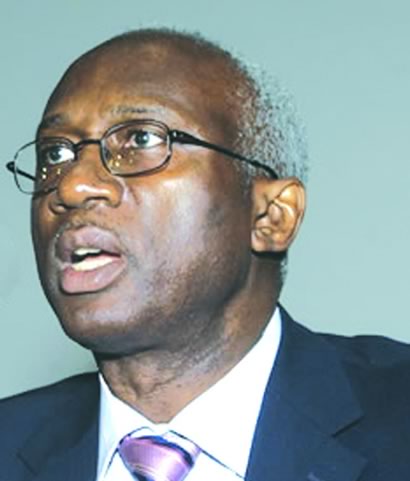News
NCC Re-affirms Commitment to ECC

Dr. Eugene Juwah, executive vice chairman, Nigerian Communications Commission (NCC) has reaffirmed the determination of the Commission to realizing the Emergency Communication Centres being established by the Commission in all the State capitals and Abuja FCT aimed at effective management of accident emergencies as well as collating information about various types of emergencies in the country.
Dr. Juwah disclosed this in Abuja when the executive members of the Road Transport Employers Association of Nigeria, RTEAN, paid a courtesy visit to the Commission in Abuja, he said the Commission has put up enormous resources to achieve this, given the critical roles that such centres will play in times of emergencies.
“NCC is very much involved in trying to redress the handling of emergencies in the country and in that regard, we are establishing thirty seven Emergency Communication Centers where emergency calls from different accidents will be received, dispatched to dispatch agents and the dispatch agents will contact the respective responsive agencies. We are going to include the police, road safety, fire service, ambulance and other agencies”, he said.
According to him, the centres will not only respond to emergencies, they will also collect and collate information about the various emergency situations so as to equip government to respond adequately, as such data collected over time will enable relevant agencies to respond more adequately”, he said.
Dr. Juwah said the Commission will support RTEAN very adequately in all its programmes aimed at curbing road accidents and other issues related to the safety of passengers on the Nigerian roads, including its plan to acquire ICT facilities such as computers to enable them discharge their responsibilities to members and the Nigerian public.
In what appeared as an endorsement of the Commissions’ efforts to establish a data bank for phone users in Nigeria through the registration of SIM Cards, the organization sort the assistance of the Commission in furnishing them with such computerized information that will contribute to the smooth management of passenger handling and passenger movements.
National President of RTEAN, Dr. Abubakar Sadiq said the union wishes to “to seek the partnership of the Commission, particularly in the area of information management as regard accident victims and data collection system in respect of passenger manifest for the purpose of sharing information with victim’s family.
“We observed that your Commission will be of great help to us in this direction, counting on your network and capacity”, he said.
Dr. Sadiq traced the history of the organization as a trade union to 1978, with a mandate to establish and protect the interest of all commercial transport operators, and owners in Nigeria whose vehicles are used for socio-economic activities as service providers in public transportation system in Nigeria.
RTEAN President also sought for the support of the Commission in sponsorship of media programmes in respect of safety campaign and advocacy materials in partnership with RTEAN and Federal Road Safety Commission, to raise the safety consciousness of road users and drivers during festive periods.
Dr. Sadiq who led representatives of RTEAN drawn from all parts of the country to the courtesy call, said the union operates democratic leadership and and is operational in the Thirty Six States of the Federation and FCT- Abuja with membership strength and population of about One Million spread across the six geo political zone.
News
NIGCOMSAT Adopts Government’s Performance System

Nigerian Communications Satellite (NIGCOMSAT) Ltd, in a strategic move to modernise its operations and foster a results-oriented workforce, has officially adopted the Federal Government’s Performance Management System (PMS).

The initiative, aimed at driving efficiency and institutionalising accountability, was marked by an intensive staff training program designed to align the agency’s operations with national performance goals and the Presidency’s vision for a digital-first public sector.
According to a statement from Stephen Kwande, the Agency’s acting head of Corporate Affairs, “the transition to PMS is a departure from historical evaluation methods. The new system is designed to provide real-time performance tracking and instill a stronger work ethic across all directorates”.
Welcoming participants, Mrs. Jane Nkechi Egerton-Idehen, managing director/CEO of NIGCOMSAT, represented by Abiodun Attah, executive diirector, Technical Services, described the adoption as “long overdue.”
She emphasised that the system is critical for ensuring that NIGCOMSAT contributes effectively to Nigeria’s broader digital economy targets.
In her opening remarks, Mrs. Chinwe Udogu, general manager, Human Resources Management, expressed NIGCOMSAT’s enthusiasm for the program, urging staff to dedicate themselves fully to the three-day training.
She noted that the exercise was pivotal in repositioning the company to achieve its highest aspirations.
The training consultant, Mrs. Njoku Chioma, said the program is expected to drive culture change, automate work processes, and strengthen institutional performance.
The three-day training, jointly organised by the Office of the Head of Service of the Federation and NIGCOMSAT Management, covers key themes including:
• Overview of the FCSSI25 as an institutional performance-driven Federal Civil/Public Service
• Service culture and workplace attitude in the Nigerian public sector
• Implementation of the Performance Management System in NIGCOMSAT
• Application of Artificial Intelligence tools to enhance performance in the Nigerian public sector
The move comes at a time when NIGCOMSAT is expanding its footprint, with recent initiatives like the 2026 SpaceTech Accelerator Programme and partnerships for grassroots digital skills training.
By strengthening its internal management framework, the agency aims to ensure that its technical advancements in satellite technology are matched by an equally efficient administrative engine.
News
Nearly 90% of Organizations Prefer Outsourced or Hybrid Models for their SOC

Most companies choose to outsource at least part of their Security Operations Center (SOC), with a significant number adopting SOC-as-a-Service (SOCaaS), according to global research by Kaspersky.

This strategic move enables organisations to benefit from round-the-clock protection, ensure compliance with regulatory standards and leverage advanced cybersecurity solutions and qualified expertise that are often beyond their internal capabilities.
As cyberthreats become increasingly sophisticated, organisations are rethinking how they build and operate their Security Operations Centers. With this in mind, Kaspersky carried out a comprehensive global survey to identify the main motivations, strategic goals, and potential challenges associated with its planning and implementation¹.
The findings of this research revealed that 64% of companies plan to outsource part of their SOC, combining internal capabilities with external expertise.
Meanwhile, over a quarter of respondents (26%) are ready to fully implement an SOC-as-a-Service (SOCaaS) model. By contrast, only 9% plan to build their SOC entirely in-house, highlighting the growing challenges of maintaining round-the-clock monitoring and attracting qualified specialists.
SOC outsourcing enables organisations to delegate selected SOC functions or even the entire operational cycle to a trusted external provider. This approach can include a variety of services:
Design and architecture of the SOC.
Deployment and maintenance of SOC technologies.
Monitoring and analysis by external security analysts.
Consulting and training services.
Full SOCaaS delivery, where the provider handles detection, investigation and response around the clock.
Most companies prefer maintaining strategic tasks internally, whilst leveraging external teams and advanced technologies for operational and highly technical workloads. Among organisations planning to outsource SOC functions, the most commonly delegated tasks to third-party providers included solution installation and deployment (55%), solution development and provisioning (53%), and SOC design (47%).
When engaging external SOC specialists, companies also showed a clear preference for augmenting specific roles, with first-line analysts (61%) and second-line analysts (52%) being the most in-demand among external specialists. These figures illustrate that companies focus more on frontline and intermediate security tasks, such as monitoring and responding to threats.
Why do organisations choose SOC outsourcing?
The leading motivator for SOC outsourcing is the need for 24/7 protection (55%) – an operational requirement many internal teams cannot sustain alone. Another highly cited benefit is reducing workload on internal IT security specialists (47%), enabling teams to focus on strategic tasks.
Additionally, access to advanced solutions and technologies (42%) and external support to ensure compliance with regulatory requirements and standards (41%) further drive the decision to outsource, highlighting the value of specialised expertise and cutting-edge tools such as XDR, MDR, MXDR and others.
Budget optimisation is important for only 37% of companies – indicating that the primary value of outsourcing lies in improved protection, not just cost savings.
“The trend towards outsourcing SOC functions, whether fully or partially, is primarily driven by the necessity for enhanced operational focus and strategic agility. By shifting routine and technical tasks externally, organisations are able to concentrate on high-value activities such as strategic decision-making and orchestrating responses to sophisticated threats.
“Moreover, this approach often results in considerable cost efficiencies, allowing for optimised resource allocation. Ultimately, this model transforms the SOC into a critical strategic capability, directly contributing to business continuity,” comments Sergey Soldatov, Head of Security Operations Center at Kaspersky.
News
DHQ Indicts Brigadier General Abubakar Sadiq, 15 Others in Alleged Coup Plot againt Tinubu

Defence Headquarters (DHQ) has made public the full names of 16 officers of the Armed Forces of Nigeria indicted by a Special Investigative Panel over alleged serious misconduct, including an alleged coup plot against President Bola Tinubu.

The officers suspected to be involved in the coup plot include a brigadier general, a colonel, four lieutenant colonels, five majors, two captains, a lieutenant, a lieutenant commander and a Squandron Leader.
Major General Samaila Uba, director of Defence Information, disclosed this on Monday, stating that the panel had concluded its investigation and established that the affected officers had cases to answer.
According to him, the indicted officers will face a military Court Martial in line with established procedures and existing regulations.
Major Gen. Uba said the probe examined the circumstances surrounding the conduct of the officers and identified actions “inconsistent with the ethics, values and professional standards expected of members of the Armed Forces of Nigeria.”
He stressed that the exercise was purely disciplinary and aimed at preserving internal discipline, cohesion and operational effectiveness, adding that the Armed Forces remain loyal to the Constitution and Nigeria’s democratic order.
- Brigadier General Musa Abubakar Sadiq (Nasarawa, 44th Regular Course)
- Colonel M. A. Ma’aji (Niger, 47th Regular Course)
- Lieutenant Colonel S. Bappah (Bauchi, 56th Regular Course)
- Lieutenant Colonel A. A. Hayatu (Kaduna, 56th Regular Course)
- Lieutenant Colonel Dangnan (Plateau, 56th Regular Course)
- Lieutenant Colonel M. Almakura (Nasarawa, 56th Regular Course)
- Major A. J. Ibrahim (Gombe, 56th Regular Course)
- Major M. M. Jiddah (Katsina, 56th Regular Course)
- Major M. A. Usman (Federal Capital Territory, 60th Regular Course)
- Major D. Yusuf (Gombe, 59th Regular Course)
- Major I. Dauda (Jigawa, DSSC 38)
- Captain I. Bello (DSSC 43)
- Captain A. A. Yusuf
- Lieutenant S. S. Felix (DSSC)
- Lieutenant Commander D. B. Abdullahi (Nigerian Navy)
- Squadron Leader S. B. Adamu (Nigerian Air Force)

 News2 days ago
News2 days agoLIRS to Invoke NTAA to Recover Unpaid Taxes from Bank Accounts, Others

 News2 days ago
News2 days agoAnambra Cuts Monday Pay to Kill Sit-at-Home

 E-Financial2 days ago
E-Financial2 days agoFirst Asset Management Receives Upgraded Ratings from Agusto &Co and DataPro

 E-Financial2 days ago
E-Financial2 days agoNIBSS, Others Flag 13,417 Nigerian Fraudsters on Person of Interest Portal

 General News2 days ago
General News2 days agoNigeria Treats Religious Violence as Attack on State – NSA Ribadu

 E-Financial2 days ago
E-Financial2 days agoCBN Prepares Fresh Debit Card Rules to Improve ATM Services

 News1 day ago
News1 day agoTech Executives Double Down on AI, Talent and Adaptive Strategies to Lead in the Intelligence Age

 E-Financial1 day ago
E-Financial1 day agoCBN Upgrades Licences of Opay, Moniepoint, Kuda, Palmpay, Paga to National Status

























